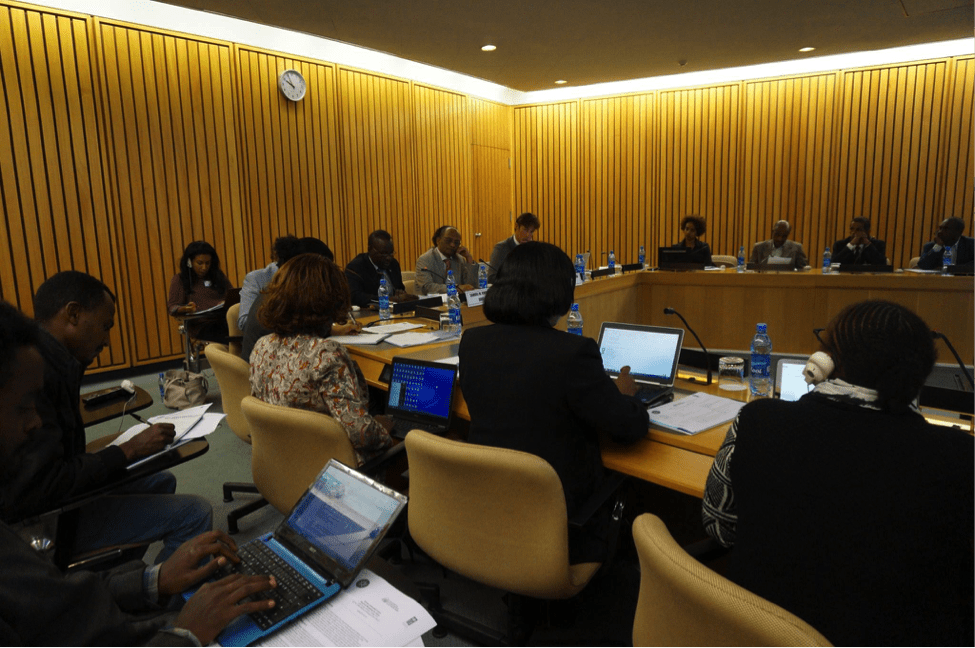Addis Ababa (HAN) May 9,2015 Public Diplomacy, Regional humanitarian, Investment News. Twelve recommendations to improve the regional response to climate change have been agreed to following a meeting for the African region at Addis Ababa on 7-8 May, 2015. The meeting, gathering twelve African countries, was part of a series of Climate Vulnerable Forum workshops currently being convened though to June 2015 in, Asia, Latin America, the Pacific and the Middle East.
The Climate Vulnerable Forum regional event for Africa, which focused on improving response to climate change for the region, was organized by the ministry of Environment and Forestry with support from the United Nations Development Programme (UNDP). Participating Governments included Burkina Faso, Comoros, DR Congo, Malawi, Niger, Senegal, South Sudan, Zambia, and Climate Vulnerable Forum members Ethiopia, Ghana, Kenya and Rwanda.
The twelve recommendations aimed at stimulating national, regional and global advances stemmed from the event’s review of challenges, gaps and success stories in Africa region’s experience in dealing with climate change:
- Priority of building stronger institutions and structures supported by policies and legal frameworks for climate change as a core economic development issue
- Importance of a strategic framework for generating greater levels of awareness of climate change at different levels, including all relevant sectors and down to communities
- Increased local technological research and development, harnessing South-South national and community knowledge
- Improved access and capacity to manage external sources of finance, in particular from major international funds including through facilitated modalities
- Increased levels of participatory monitoring and evaluation of climate actions essential to effective responses and implementation
- Mainstream gender-responsive climate change actions cross-sectorally into economic development for a Green Economy approach
- Reinforce infrastructure for renewable energy, transportation and water
- Boost involvement of private sector in climate action through incentives and adapted communication
- Establish robust cross-sectoral and vertical coordination systems, including for policy implementation and legal frameworks
- Reinforce vital capacities both institutional and at local levels which are indispensable to achieving action on the ground
- Ensure increased financing for adaptation for African countries
- Put climate change policy into action
Speaking at the opening session of the regional event, the Hon. Minister of Environment and Forestry of Ethiopia, H.E. Mr. Belete Tafere said: “In gathering here for these two days, we have a chance to delve further into what precisely is holding back progress in Africa. We can showcase what is working well, and what have been our key successes. And we have a new opportunity to build support, joining with other countries, to address our concerns. We see it as vital to work with vulnerable countries from other regions, including other LDCs, the SIDS and also vulnerable middle-income countries like Philippines, who currently chairs this Forum.”
Addressing the delegates, the representative of Ghana, who acted as co-facilitator of the working sessions, Dr. Emmanuel Techie-Obeng of the Environmental Protection Agency of Ghana said: “Extreme temperatures are riveting African economies as we speak, but the impact of more hot days and hot hours on labour, on the workplace, on workers’ health and on productivity and GDP is unrecognised. This is just one example of a single impact of climate change and gaps in our current approaches, where in particular the social dimensions of climate change are so key. What is truly vital is strongest possible African leadership and national climate change policy governance.”
Mr. Sam Bwalya, Country Director of the United Nations Development Programme, a Forum partner for the event, commented that: “African countries need to learn from each other more than more than ever before and to tap into the ingenuity of its people, and innovations and best practices available across the continent and the world to firmly tackle climate vulnerabilities and associated development challenges including those for which this forum is intimately dedicated. This Climate Vulnerable Forum meeting for Africa has given an opportunity to reflect more comprehensively on the specific priorities for Africa that will help to enhance the continent’s response to climate change.”
The regional event is the Africa input to a global consultation of the CVF being held in June 2015 where the conclusions of all Climate Vulnerable Forum regional meetings will be reviewed together to inform the Forum’s forward communications and activities.
UNDP provides support to the Climate Vulnerable Forum through a dedicated global project and, separately through its Multi-Partner Trust Fund Office, UNDP administers the Climate Vulnerable Forum Trust Fund whose implementing partners include the International Organization for Migration (IOM), UNDP, the United Nations Office for Disaster Risk Reduction (UNISDR) and the World Meteorological Organization (WMO).
HAN & Geeska Afrika Online (1985-2015), the oldest free independent Free Press in the region, brings together top journalists from across the Horn of Africa. Including Ethiopia, Somalia, Eritrea, Sudan, Djibouti, South Sudan, Uganda, Kenya, Oromo, Amhara, Somali, Afar and Harari. Plus, we have daily translations from 150 major news organizations in the Middle East and East African regions. Contact at news@geeskaafrika.com
Geeska Afrika Online (1985 -2015) – The International Gateway news and views about the Horn of Africa (Ethiopia, Eritrea, Somalia, Somaliland, Sudan, South Sudan, Djibouti, Kenya and Uganda), the best IGAD news and information Online Site for the last 30 Years.


Leave a Reply